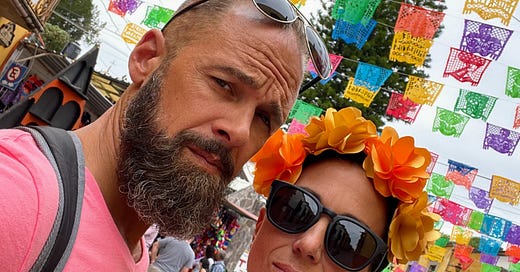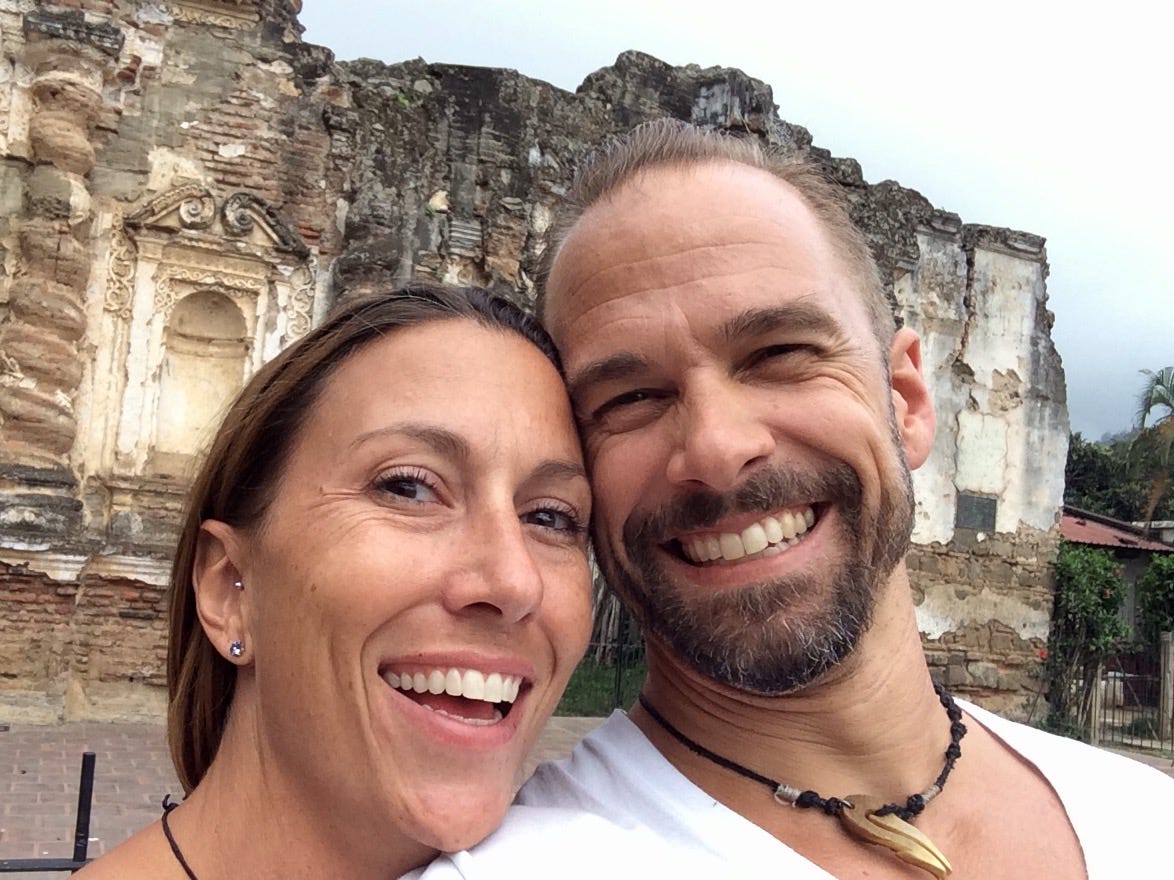It was an otherwise mundane morning in Tamarindo, Costa Rica, sometime in late 2013. I was doing my morning duties of setting up the tables, chairs, and matte-black surfboard we used as a sandwichboard to lure foot traffic.
Cristina and I had been co-running our little take-out pizzeria, Pizza & Co, for a couple of months… Co-running is not quite right.
Before we closed on purchasing the broken little business, I’d decreed it would be her operation. I would be there for marketing support, showing some leg, and whatever else would drive foot traffic. Most mornings it meant setting up and finding a space for my laptop so I could work, preferably out of Cristina’s way. It was a tiny space.
As I stood there looking at the surfboard, considering what I might write on it, two ladies of retirement age sauntered up the sidewalk. They both led with that standard goofy grin tourists tend to sport, eyes wide and mouths agape.
“Buenos dias,” the lead woman beamed at me, proud of her thickly American-accented Spanish. It sounded more like, ”Bwayne-ahs dee-ahs.”
“Buenos dias y como estamos, amigas?” I fired back confidentially, rich with my best Guanacastecan accent. [read: mumbly and fast]
She quickly averted her eyes to the surrounding forest canopy. “Ope!” she exclaimed over her shoulder to her companion, giggling a little as she said it. “Didn’t understand that!”
Pushing up my bottom lip and raising my eyebrows, I stared them on with the lightest gaze I could muster. Inside my head, I hated them.
Stupid American tourists fronting like they could speak Spanish…
And then I noticed the rising hate.
One of the untold liabilities of a regular mindfulness practice, which by the way nobody warns you about, is that you may notice things you wish you hadn’t. Oh, I dunno, like your own very bad-terrible-awfulest parts.
I’d just acted in an intimidating manner but in the most Midwestern way. Oh, sure I’d used simple Spanish to ask, “How are we doing?” but I definitely said it in a way that sounded more like, “Hey, fuck off.”
Make note, hopeful restauranteurs. This is not how to start one’s day on a good foot. Related, nor is it a wise way to show up for life in general.
No wonder my place in the pizzeria was best found somewhere in a corner.
Shortly after this event, I found a more suitable workspace back at our flat. From there on, I made fewer appearances at the pizzeria. There were too many distractions there anyway.
But here’s what’s also true. Engaging with tourists from home always felt annoying back then, even if I couldn’t admit it to myself. (Like how I’m having a hard time admitting that this is still a problem for me today.)
American tourists? To an American expat?
Loud, as if everyone else wants to hear them complain about dumb stuff.
They’re culturally blind to how obnoxious they seem.
And they remind me of the parts of myself I’ve gladly left behind.
In many ways, I also hate parts of myself for hating them. I know this is unwise.
For hatred does not cease by hatred at any time: hatred ceases by love. This is an unalterable law.
~The Historic Buddha (from the Dhammapada, translated by Eknath Easwaran)
This was a concept I’d yet to onboard at the time. Since then, however, it’s a truth I return to often: Hate will never end hate. It will only exacerbate it.
For the record, I don’t think self-hatred is an exclusive attribute of expats. As a coach, I’ve been deep in conversation with enough humans to know that we all can feel hatred toward parts of ourselves. Some of us bear that burden our whole lives in sunless ignorance of anything brighter.
But expats are a special bunch when it comes to self-loathing.
Expats hate parts of ourselves so much, that we attack each other on otherwise non-serious matters as if that will reconcile anything. As one example, I’ve been word-policed more than once about my use of the word “expat,” as opposed to the word “immigrant” to describe my status.
There are alternate perspectives1, but I’ll not defend myself on this point. They’re both fine words, describe the same population (regardless of origin), and the only people who really care are the very people who debate the point.
The rest of the developing world has real problems to sort out. But, us foreign residents really like a good fight with ourselves, yes current versions, but especially the former.
Anyway…
Coming into sobriety and a meditation practice in my first year of expat life was, to me at that time, a total rejection of my former self. I would rise like the phoenix, a totally new person who could look back in disdain at that weak, former version who fled his life.
It’s a cute notion and just a story about what was actually going on at that time. In truth, it was time to put the bottle down before it put me down, and I’d had a pet interest in meditation for years. I just hadn’t made the time to focus on it yet.
For anyone who’s traveled abroad, you may have met these expats unknowingly.
And by “traveled abroad” I don’t mean flying to “Little America” in some all-inclusive retreat, far from the true culture of a foreign nation. I mean the folks who’ve been intentionally lost on the streets of someplace where they didn’t know the language well enough to feel comfortable being lost.
Most of us are good at putting on a nice face, welcoming travelers into our space, and being helpful when asked. That’s even as we might be seething inside about every rule the traveler breaks.
For anyone who has traveled to the Southern United States, you’ll know the feeling. Southern charm, for those who don’t know, has nothing to do with actually liking another person. In Minnesota, they call it Minnesota Nice.
Same thing. It’s all a front. Those same sweet faces will hunt you down on the freeway if you cut them off in traffic. Find them on the wrong side of the bed someday, and they might pull out a gun.
Note: Charming and Nice are not to be trusted.
Dang. I’ve meandered. Apologies.
The other truth about expats is that we draw hopeful future expats to ourselves like flies to dog shit. When folks from “back home” get a whiff of our brazen lifestyles, they can’t help but investigate. And that’s when the questions arise.
Don’t you just lovvve it?
How didja do it?
How do I ship all of my belongings to [remote location]?
It’s fine. Actually, one of the coolest parts of living abroad, other than seeing cool new shit, is being a part of someone else’s exploration of this idea, even as we know most won’t pull the trigger.
What’s worse, most will return home in the first year. It may be for the very reasons I’m surfacing in this piece.
It’s not only hard to face versions of one’s former self in front of one’s pizzeria, it’s also just hard to live abroad. Even for those wealthy enough to live on their stored savings. The main challenge, especially for older expats, is language.
There’s a causal banter to life that one surrenders when living where they don’t speak the language. Learning enough to get by is the absolute bottom rung. Anything less than knowing how to find what one needs will not do.
But there are layers to communication that we fail to notice in our otherwise boring lives.
Setting aside the vertical ascent of mastering verb conjugations, the use of sarcasm and metaphor also comes to mind. We hardly realize how often we speak in poetic ways, using symbols in place of what we’re really talking about.
One expat friend of mine took a trip home to New York after a couple of years in Costa Rica. There, he realized how much he missed playful banter with checkout clerks and others. A life devoid of these exciting little entanglements can feel quite isolating in the aggregate.
And to the stubborn expat, this just adds to the self-hatred.
But don’t get me wrong. I love this life. You’d have to drag me back, clawing and screaming, to what we’ve surrendered.
High costs of living
Politically-tribal in-fighting about every. single. damn. thing
Actual violence from normies, not criminals
Needing to own a car
Hustle culture
Hell no to all of it
Today? I pine for a more enlightened version of this life, one where I have come into tolerance (or even compassion) with that naive part of myself that used to fantasize about owning “a bar on the beach someplace tropical.”
At the risk of sounding idealistic, it’s a nice idea to think about putting down hatred, starting with the hatred of self. That’s a kind of freedom we’d all be wise to want.
In the end, all these versions of self are just stories, and there is no current self at the center of experience who could show compassion to them. Not really. That’s just another story. But there is a kind of freedom that sounds lovely, and it’s right here for the taking when this mind truly knows what has been true all along.
There was no true distance separating this concept of me from that woman on the street. As I ever am, I was only being awful to myself.
My friend Nadine publishes a Substack from another part of Mexico, and she has a different take on the word expat if you’re curious. She won’t be called an expat. That’s what suits her. I respect her, her perspective, and her request.











First of all, I lived for the frogs in CR. Is that Cristina with their most famous hopper?
You and I could talk about this for ages, but I especially relate to hating them, then hating ourselves for hating them, then realising we hate ourselves and that's why we hate...
Eg.
I walked past a tall American just yesterday and glared at him in distain. And I wasn't guessing from his size or slides that he was 🇺🇲 I was basing that assumption on the accent that I could hear extremely clearly as he had a (what I'd call) shouted conversation into his phone. That volume is one I reserve for when I'm actually angry. How bizarre. But more bizarre is that people assume I'm LIKE HIM when they see me on the street *seeths in migrant* 😆
Thank you for the tag and nod 🙂↕️ at the end.
I appreciate this piece, Damon. Nice reflection. It’s not all sunshine and ocean breezes. That banter you mentioned is definitely something I miss. However, not enough to go back for more than a few days .
And as for the “expat” vs “immigrant” debate. I get it but I’ve got other things on my mind and I guess I’ve started calling myself an immigrant in my mind but I’m not going to make a big deal out of it.